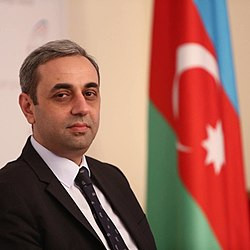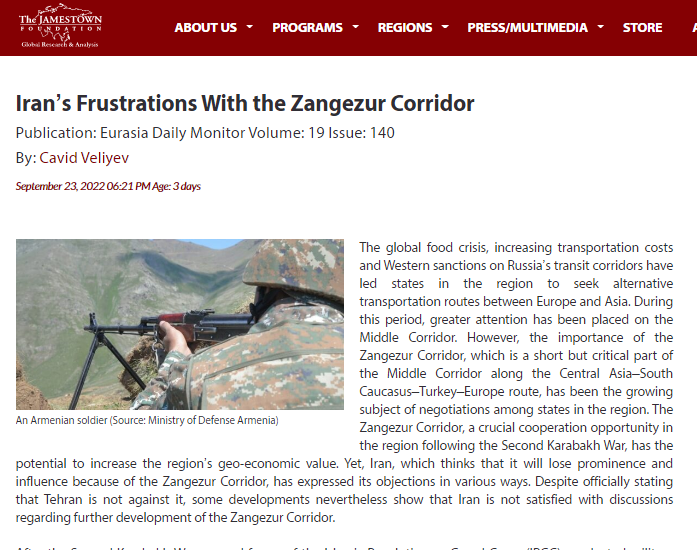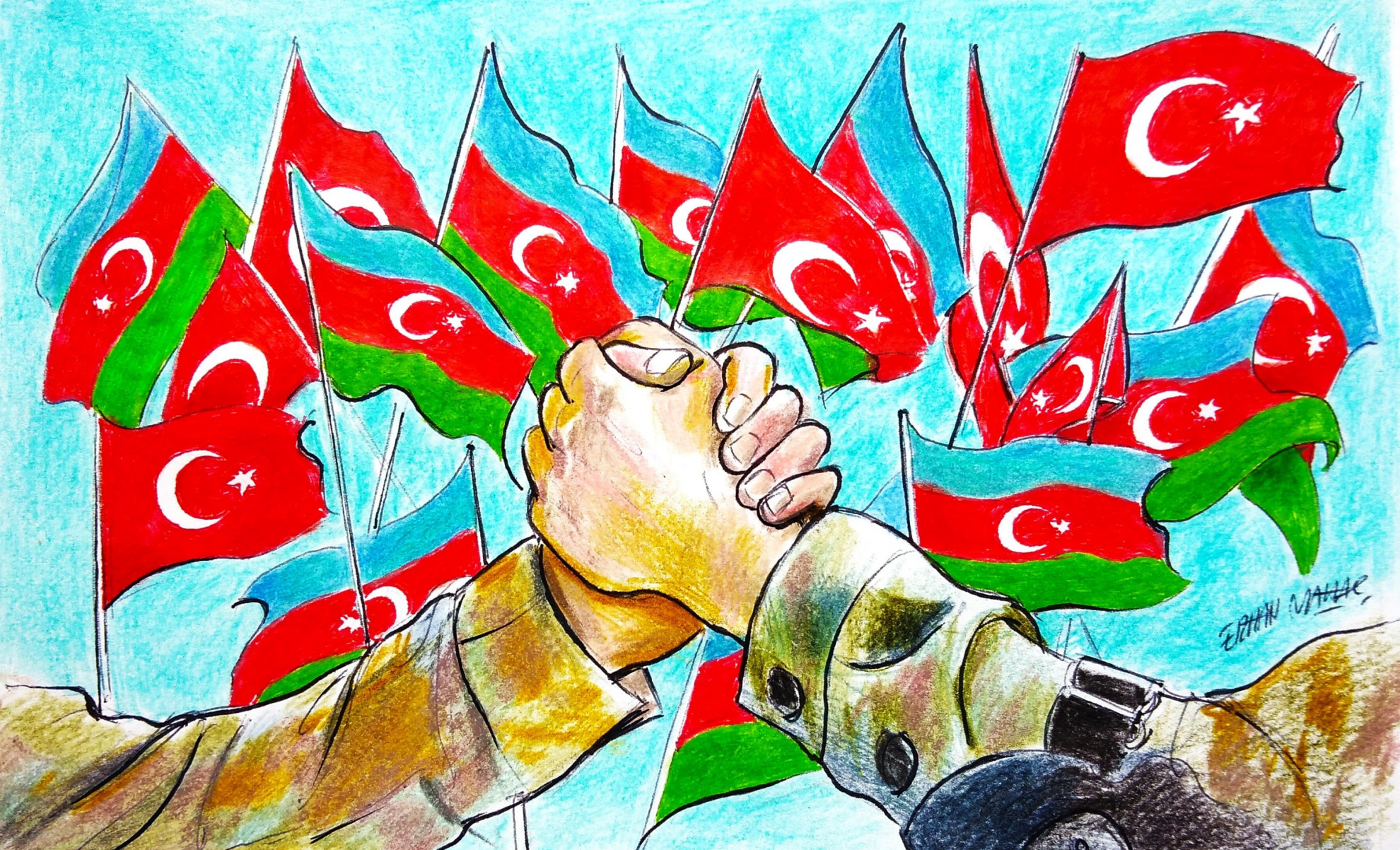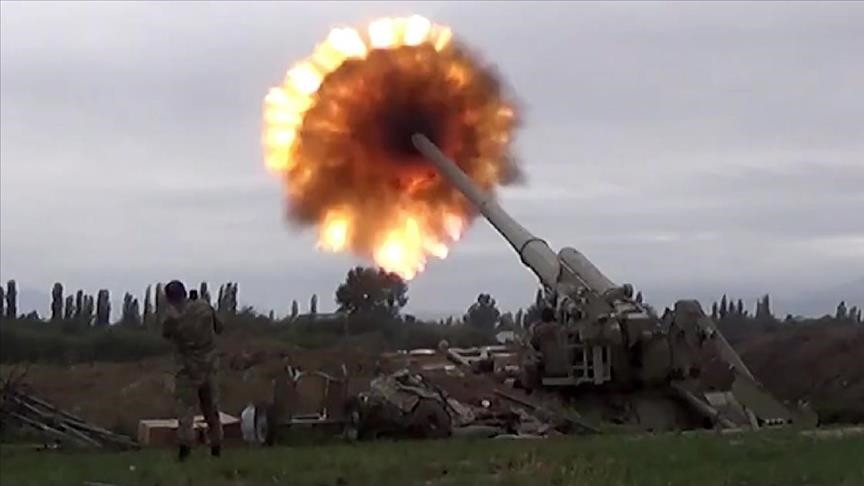The global food crisis, increasing transportation costs and Western sanctions on Russia’s transit corridors have led states in the region to seek alternative transportation routes between Europe and Asia. During this period, greater attention has been placed on the Middle Corridor. However, the importance of the Zangezur Corridor, which is a short but critical part of the Middle Corridor along the Central Asia–South Caucasus–Turkey–Europe route, has been the growing subject of negotiations among states in the region. The Zangezur Corridor, a crucial cooperation opportunity in the region following the Second Karabakh War, has the potential to increase the region’s geo-economic value. Yet, Iran, which thinks that it will lose prominence and influence because of the Zangezur Corridor, has expressed its objections in various ways. Despite officially stating that Tehran is not against it, some developments nevertheless show that Iran is not satisfied with discussions regarding further development of the Zangezur Corridor.
After the Second Karabakh War, ground forces of the Islamic Revolutionary Guard Corps (IRGC) conducted military exercises along the Iranian–Azerbaijani–Armenian border, which many Iranian experts believe sent a clear message to all proponents and designers of the Zangezur Corridor (Khabaronline.ir, March 25). Although Iranian officials have not directly expressed a view in opposition to the Zangezur Corridor, Tehran is pursuing a policy of supporting the North-South Corridor, which rivals Zangezur (Irna.ir, March 4). When the Zangezur Corridor was on the agenda, Iran instead promoted the North-South Corridor’s Armenian connection. However, it is telling that the Iranian government is reluctant to implement the agreements previously signed with Azerbaijan and Russia regarding the North-South Corridor.
In truth, Iran’s elites are worried that development of the Zangezur Corridor will decrease the country’s geo-economic value for four primary reason. First, Tehran will lose its feature of being the main connection between Azerbaijan’s territory and the Nakhchivan Autonomous Republic. Second, Iran will lose its unifying role between Turkey and Central Asia. Third, the county will lose its merging point with the Eurasian Economic Union (EEU). And fourth, following the Russian-Ukrainian war, as the Middle Corridor increases in strategic value, the Zangezur Corridor will further diminish Iran’s central role in transportation between East and West.
Before the Second Karabakh War, the road between Azerbaijan and the Nakhchivan exclave passed through Iran. With the Zangezur Corridor, this situation may change, as the route will pass through Armenia. In this case, Baku’s dependence on Tehran to establish transportation with Nakhchivan will be reduced. The Zangezur Corridor will also be an inland link between Azerbaijan and Turkey. As Abolfazl Zohrevand, a retired Iranian diplomats, has said: “Even if this underground tunnel is a direct road between Turkey and Azerbaijan, we would have problems. Because it is the only transit route that Iran can use against Turkey.” Additionally, according to domestic media, Iran provides the best route for Turkey’s connection with Azerbaijan and Armenia, as well as to the outside world (Khabaronline.ir, March 25).
A key portion of Turkey’s trade with Central Asia relies on transit by truck via Russia and Iran. Annually, 43,000 Turkish trucks pass through Iran to Central Asia. At times, Tehran has applied an additional tax to Turkish trucks in one direction (Al-monitor.com, December 29, 2014). When Ankara started to charge the same fare for Iranian vehicles as a reciprocal requirement, Iran increased its fare by 100 percent (Milliyet.com.tr, October 18, 2014). Occasional political crises experienced between Turkey and Iran, which are rivals in the region, have adversely affected the Turkish government’s access to Central Asia. With the opening of the Zangezur Corridor, Ankara will obtain a new alternative and shortcut for trade with Central Asia.
Since the start of the Russian-Ukrainian war, the Middle Corridor’s importance has increased exponentially due to Western sanctions imposed on Russia’s most consequential transit routes. This also means that the strategic value of the countries along the Middle Corridor has increased for the United States and European Union as well. At the same time, this means cooperation opportunities for regional states with the West will increase even more because the Zangezur Corridor is, in fact, similar to the EU’s Transport Corridor Europe Caucasus Asia (TRACECA) project. Moreover, it is also similar to the Turkey–South Caucasus–Central Asia Silk Road transportation project supported by the US in the 1990s. This means that Iran’s status as a major transit country, and therefore its strategic value, is weakening. In this sense, Iranian Foreign Minister Amir Abdollahian’s statement during his meeting with Russian Foreign Minister Sergey Lavrov in Moscow on August 31 is remarkable. Specifically, Abdollahian declared that Iran enjoys a privileged geopolitical position within the north, south, east and west transit routes (Khabaronline.ir, August 31).
Nonetheless, Iran views Armenia as a “gateway” for entering the markets of Russia and other EEU member states. A free-trade agreement between Iran and the EEU was signed in 2018 and entered into force in 2019. The three-year negotiation process was initiated between the parties, and an agreement was struck to eliminate customs duties for goods and services. At the end of three years, the free-trade agreement was due to be signed between the parties. The final negotiations between Iran and the EEU were held in Yerevan on April 28 (News.am, April 28).
At the end of negotiations, this process will result in the removal of customs duty on 80 percent of the goods and services traded between the two parties. In this context, it is planned that Armenia’s relations with Iran will facilitate the entry of the EEU into Middle East markets and, as a result, provide additional economic development for Armenia (Armenpress.am, April 28). According to Abbas Zohuri, the Iranian ambassador to Armenia, Yerevan is an extremely reliable and solid bridge for trade deals with other countries, including the EEU and EU (Radar.am, August 25)
As such, Iran continues to object indirectly to the Zangezur Corridor. It sees Zangezur as a rival to its geo-economic importance and, at this point, is not hesitating to impose military, economic and political pressure. In this way, Tehran is playing its own hand in the region. Indeed, many believe that Iran’s carrot-and-stick policy is behind Armenia’s resistance regarding future development of the Zangezur Corridor.
https://jamestown.org/program/irans-frustrations-with-the-zangezur-corridor/








